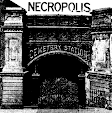ON THE TWENTY-NINTH NIGHT OF HALLOWEEN (delayed post) ... I put together and finished "The Feeble Light of Dreams," as you can see below. My plan had been to do at least four of these illustrated poems, but as usual, my monsters wound up eating much more of my time than expected.
Meanwhile, I continued watching heaps of horror flicks, including the following group of non-supernatural but also not traditional slasher ones: The Invitation (2015); The Beast in the Cellar (1971); High Tension (2003); Creep (2014); and Dementia (1955).
The Invitation is another one I've had on my watch-list since it came out, but put off due to lack of interest in the subject matter, in this case a yuppie dinner party gone awry. The first two thirds seemed to confirm my suspicions, but the cold and sudden brutality of the betrayal that precipitates the climax won me over, making the long windup worthwhile.
The Beast in the Cellar is similarly very dull until the last third, when it is redeemed by a flip of the script with the identity of the monster, contrary to both narrative and social prescription. This British work of biddie horror masquerading as a subhuman maniac slasher has some great ideas, but it would have worked much better as 45-minute Tales of the Unexpected episode than a 90-minute feature.
High Tension has the opposite problem: its first two thirds functions as a bone-crunchingly well-executed (ahem) slasher that is fatally tripped up by a nonsensical "twist" with no clear point (other than maybe casual homophobia?). Maybe the twist was more effective in 2003-- plots where it turns out one of the main characters was the whole time a figment of another character's imagination, with the latter actually carrying out all the hallucinated character's actions, have since become obnoxious and laughable through overexposure.
Creep doesn't have either problem: it is incredibly tense and hypnotic from beginning to end. It's a first-person mockumentary/found-footage film that serves as a claustrophobic character study of the titular psychopathic Creep, who has enlisted the POV videographer through a Craig's List ad to come out to his remote cabin and document a day of his life before his supposed imminent demise from cancer. Though there is no gore until the final shot, the emotional violence of Creep is more jarring than most slasher kills.
Dementia is an awesome '50s art horror film with no dialog. It documents the nightmare of young woman lost in a labyrinthine expressionist city populated by film-noir archetypes. Every moment is beautifully shot and contributes to the propulsive narrative's momentum, which mirrors the way the protagonist is carried along by the dictates of dream logic and her own urges. It was shot outside the studio system, self-funded via the filmmaker's profits from the theater he owned in Portland (the J.J. Parker theater, which is still operating as the Guild Theater on Taylor and 9th). As a result, it mystified critics at the time and was pegged as an experimental film by an outsider artist, which it really isn't. It's a straightforward and entirely legible work of noir-infused, Twilight-Zone-esque horror that just happens to have no dialog.


No comments:
Post a Comment